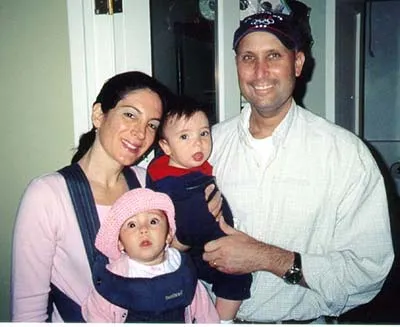Caregiver’s Remorse

Editor's Note: This is part of Nancy's Caregiving series. Please see other posts in this series.
By the time my children Casey and Rebecca had turned a year old, my husband Brett was once again in remission from his brain tumor. His hair never grew back after the initial round of chemotherapy and radiation, and he was still tired much of the time, but he was well enough to give what little energy he had to his family when he was not working.
We celebrated Brett’s remission by taking the twins on a long summer weekend to Ocean City, NJ. The trip was my idea. I wanted to rekindle happy memories spent at the beach by inviting much-needed sunshine into our lives. This would be our first family vacation.
How quickly my excitement turned into exhaustion. Just gathering the toys, towels, food, baby things, and other necessities was an ordeal. I was not prepared for crying babies who disliked the sun and the sand. It dawned on me midway through our brief getaway that I wanted the dream of a peaceful vacation, not the reality; I’d actually made my life harder by changing our environment.
But that wasn’t all. I also wanted the fantasy of being a normal family, not our reality of cancer’s inescapable clutch. I wrote about the implausibility of escaping cancer’s reality in my memoir Both Sides Now: A True Story of Love, Loss, and Bold Living.
One afternoon when the twins were supposed to be napping but wouldn’t, we brought them to a nearby park, hoping the walk and fresh air would tire them. Another mother at the park admired them and without provocation told me that her daughter had been a twin. She pointed to her daughter, Mary, climbing up the jungle gym. ... “Joe died of a brain tumor two months ago,” she said. “He was ten years old.” I swallowed hard, frightened by what she’d revealed. And yet the calm on her face surprised me. I told her about [Brett's] condition, each of us feeling compassion for the other. How was she managing? I asked. “He’s with me all the time. It’s like he’s in another room.”
This grieving mother was the face of courage, and it both saddened me and gave me hope. I was no longer living with illusions of cure—I knew the odds for Brett’s survival were low—I just wanted time.
We weren’t exactly waiting for the death knell, but knowing it was coming filled me with anticipatory grief, a common symptom for cancer caregivers. I wanted to be like the other New York City mothers that I saw sitting contentedly at Riverside Park. They leafed through glossy magazines and chatted with friends over lattes, smiling often as the future lay before them like an open slate—which I imagined it was.
By September 2003 when the twins were 16 months old, it was clear to me that Brett was fading. He still pushed himself to go to work, but he moved slower, talked slower, thought slower. I understood that it was vital for his psyche to provide for his family. He was still relatively independent at that point. We weren’t yet ready to broach the subject of disability since his recent MRI was clean. I helped him write memos and reports for work since his job was our job
Being aware your spouse is going to die, but not knowing when, created an uncomfortable dilemma. I couldn’t understand how Brett’s scans were normal based on the significant changes I observed in his day-to-day functioning. He was a shadow of the healthy, vibrant man he once was.
It had been six long years since Brett’s diagnosis. Was it wrong to admit that I wanted it to be over?
Three things brought me calm during this stressful period.
I tried to walk every day, just to be in nature and feel less alone in my bewilderment.
I put the twins to bed early each night because I badly needed rest.
I rested my head on Brett’s shoulder as often as possible, taking in the scent and feel of him. He was still here…for now.
Suggested Resources:
Caregivers
www.CancerSupportCommunity.org/caregivers
10 Tips for Caregivers
www.CancerSupportCommunity.org/living-cancer/living-cancer-topics/caregivers/ten-tips-caregivers
Friends & Family
www.CancerSupportCommunity.org/family-and-friends
Brain Tumor Treatment
www.CancerSupportCommunity.org/brain-tumor-treatment
Fatigue
www.CancerSupportCommunity.org/fatigue
Bereavement
www.CancerSupportCommunity.org/bereavement
Find Support
www.CancerSupportCommunity.org/find-support
Find a local CSC or Gilda's Club for support groups and other resources
www.CancerSupportCommunity.org/FindLocation